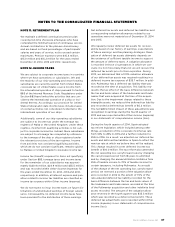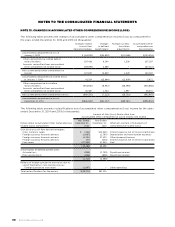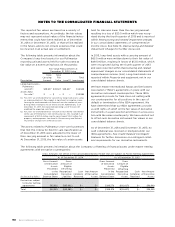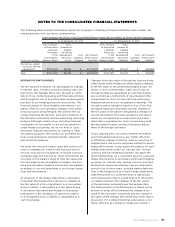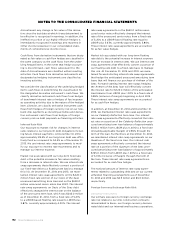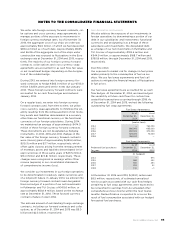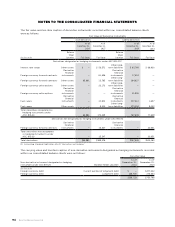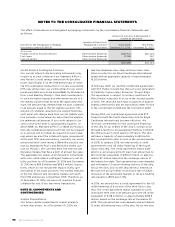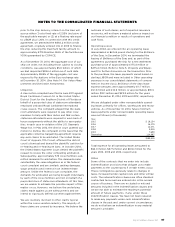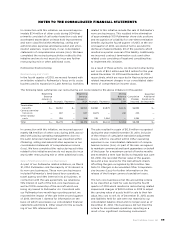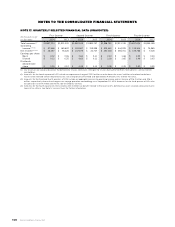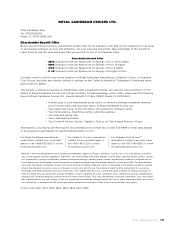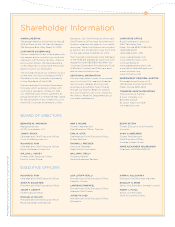Royal Caribbean Cruise Lines 2014 Annual Report Download - page 98
Download and view the complete annual report
Please find page 98 of the 2014 Royal Caribbean Cruise Lines annual report below. You can navigate through the pages in the report by either clicking on the pages listed below, or by using the keyword search tool below to find specific information within the annual report.
Royal Caribbean Cruises Ltd. 97
NOTES TO THE CONSOLIDATED FINANCIAL STATEMENTS
prior to the ship delivery, interest on the loan will
accrue either (1) at a fixed rate of 2.53% (inclusive of
the applicable margin) or (2) at a floating rate equal
to LIBOR plus 1.20%. In connection with this credit
agreement, we amended the €892.2 million credit
agreement, originally entered into in 2013 to finance
the ship, reducing the maximum facility amount to
approximately €713.8 million. Both of the facilities are
100% guaranteed by COFACE.
As of December 31, 2014, the aggregate cost of our
ships on order, not including those subject to closing
conditions, was approximately $5.0 billion, of which
we had deposited $394.4 million as of such date.
Approximately 28.8% of the aggregate cost was
exposed to fluctuations in the Euro exchange rate
at December 31, 2014. (See Note 14. Fair Value Meas-
urements and Derivative Instruments).
Litigation
A class action complaint was filed in June 2011 against
Royal Caribbean Cruises Ltd. in the United States
District Court for the Southern District of Florida on
behalf of a purported class of stateroom attendants
employed onboard Royal Caribbean International
cruise vessels. The complaint alleged that the state-
room attendants were required to pay other crew
members to help with their duties and that certain
stateroom attendants were required to work back of
house assignments without the ability to earn gratu-
ities, in each case in violation of the U.S. Seaman’s
Wage Act. In May 2012, the district court granted our
motion to dismiss the complaint on the basis that the
applicable collective bargaining agreement requires
any such claims to be arbitrated. The United States
Court of Appeals, 11th Circuit, affirmed the district
court’s dismissal and denied the plaintiffs’ petition for
re-hearing and re-hearing en banc. In October 2014,
the United States Supreme Court denied the plaintiffs’
request to review the order compelling arbitration.
Subsequently, approximately 575 crew members sub-
mitted demands for arbitration. The demands make
substantially the same allegations as in the federal
court complaint and are similarly seeking damages,
wage penalties and interest in an indeterminate
amount. Unlike the federal court complaint, the
demands for arbitration are being brought individually
by each of the crew members and not on behalf of a
purported class of stateroom attendants. At this time,
we are unable to estimate the possible impact of this
matter on us. However, we believe the underlying
claims made against us are without merit, and we
intend to vigorously defend ourselves against them.
We are routinely involved in other claims typical
within the cruise vacation industry. The majority of
these claims are covered by insurance. We believe the
outcome of such claims, net of expected insurance
recoveries, will not have a material adverse impact on
our financial condition or results of operations and
cash flows.
Operating Leases
In July 2002, we entered into an operating lease
denominated in British pound sterling for the Brilliance
of the Seas. In December 2014, we terminated the
leasing of Brilliance of the Seas and, as part of the
agreement, purchased the ship for a net settlement
purchase price of approximately £175.4 million or
$275.4 million. Refer to Note 5. Property and Equip-
ment for further discussion on the transaction. Prior
to the purchase, the lease payments varied based on
sterling LIBOR and were included in Other operating
expenses in our consolidated statements of compre-
hensive income (loss). Brilliance of the Seas lease
expense amounts were approximately £11.7 million,
£12.3 million and £14.6 million, or approximately $19.3
million, $19.1 million and $23.3 million for the years
ended December 31, 2014, 2013 and 2012, respectively.
We are obligated under other noncancelable operat-
ing leases primarily for offices, warehouses and motor
vehicles. As of December 31, 2014, future minimum
lease payments under noncancelable operating leases
were as follows (in thousands):
Year
Thereafter
Total expense for all operating leases amounted to
$52.0 million, $57.5 million and $61.6 million for the
years 2014, 2013 and 2012, respectively.
Other
Some of the contracts that we enter into include
indemnification provisions that obligate us to make
payments to the counterparty if certain events occur.
These contingencies generally relate to changes in
taxes, increased lender capital costs and other similar
costs. The indemnification clauses are often standard
contractual terms and are entered into in the normal
course of business. There are no stated or notional
amounts included in the indemnification clauses and
we are not able to estimate the maximum potential
amount of future payments, if any, under these
indemnification clauses. We have not been required
to make any payments under such indemnification
clauses in the past and, under current circumstances,
we do not believe an indemnification in any material
amount is probable.


